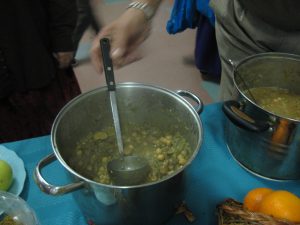Recipe for Panspermia
submitted by Melissa G.
This is a recipe for the bean stew served at Pyanepsia

Ingredients:
1 cup fava beans
1 cup chickpeas
2 cups lentils (big green ones)
2 cups peas (dried and split or fresh)
3 onions, chopped
3 stalks celery, chopped
Several cloves of garlic, minced
1/3 cup olive oil
7 bay leaves (7 relates to Apollo)
½ bunch chopped parsley
water or vegetarian soup stock
Flavorings for the meal:
balsamic vinegar
oregano
salt
olive oil
Soak chickpeas and fava beans separately for many hours, changing water several times. The last soak can be overnight. Next day, bring water level to top of fava beans and boil them separately until skins easily slip off the beans. Meantime, boil chickpeas separately in water or soup stock with the bay leaves. Sauté onions and celery and add to the pot while cooking along with some salt (pepper would taste great but is probably Hellenic rather than Classic). When the fava beans have been husked, add them to the chickpeas. Cook until both beans are soft. Add lentils, peas and parsley, and cook about 30 minutes more. Add minced garlic during the last minute or two of cooking. When beans are tender and all liquid is absorbed, the dish is ready to serve. At the festival, set the pot on the table along with olive oil, salt, oregano and balsamic vinegar and each person seasons their meal as they wish (this is still the traditional way of serving this bean dish in Greece).
While other beans can be used, the ones above reflect the varieties of beans known to be available in ancient Greece in antiquity. Onions, garlic and celery as well as oregano and flavored vinegars are also authentic. The important thing is that everyone share the panspermia together and enjoy camaraderie and good spirits! Good bread and a bit of feta are also good with this dish and, of course, wine!
Here is the mythos behind this custom. According to Plutarch, Theseus, after burying his father, paid his vows to Apollo on the seventh day of the month Pyanepsion; for on that day he and his companions had come back to Athens in safety. The ancient custom of boiling all sorts of legumes on the 7th of Pyanepsion is said to have arisen from the fact that the youths who were brought safely back by Theseus put what was left of their provisions into one common pot and boiled it all together, feasted upon it and ate it all up together.
[Plutarch, Lives: Theseus XXII.4-5]
